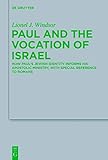Paul and the Vocation of Israel : How Paul's Jewish Identity Informs his Apostolic Ministry, with Special Reference to Romans.
Material type: TextSeries: Beihefte zur Zeitschrift für die neutestamentliche Wissenschaft und die Kunde der älteren KircheCopyright date: ©2014Description: 1 online resource (320 pages)Content type:
TextSeries: Beihefte zur Zeitschrift für die neutestamentliche Wissenschaft und die Kunde der älteren KircheCopyright date: ©2014Description: 1 online resource (320 pages)Content type: - 9783110369830
- 3110369834
- 9783110332018
- 3110332019
- 1306569796
- 9781306569798
- 9783110331882
- 3110331888
- Paul, the Apostle, Saint
- Paul, the Apostle, Saint -- Jewish interpretations
- Bible. Romans -- Criticism, interpretation, etc
- Paul, the Apostle, Saint
- Bible. Romans
- Israel (Christian theology) -- Biblical teaching
- Israël (Théologie chrétienne) -- Enseignement biblique
- RELIGION -- Biblical Studies -- New Testament
- RELIGION -- Biblical Studies -- Paul's Letters
- Israel (Christian theology) -- Biblical teaching
- Jewish interpretations of the Apostle Paul
- Judentum
- Exegese
- Israel Theologie
- Mission
- Jewish Identity
- New Testament
- Paul
- Romans
- 227/.106
- BS2665.52 .W56 2014
- online - EBSCO
- BC 7290
| Item type | Current library | Call number | URL | Status | Notes | Barcode | |
|---|---|---|---|---|---|---|---|
 eBook
eBook
|
Biblioteca "Angelicum" Pont. Univ. S.Tommaso d'Aquino Nuvola online | online - EBSCO (Browse shelf(Opens below)) | Online access | Not for loan (Accesso limitato) | Accesso per gli utenti autorizzati / Access for authorized users | (ebsco)753968 |
Print version record.
1 Introduction; 1.1 Paul's Jewish identity; 1.2 The vocational dimension of Jewish identity; 1.3 Romans: An exercise in Jewish vocation; 1.4 Preview of the argument; 2 Review of literature; 2.1 Paul's apostolic mission and Israel's vocation; 2.1.1 "Patterns of religion" approaches; 2.1.2 Albert Schweitzer; 2.1.3 Johannes Munck; 2.1.4 Krister Stendahl; 2.1.5 Karl-Wilhelm Niebuhr; 2.1.6 Stanley Stowers; 2.1.7 James Dunn; 2.1.8 N.T. Wright; 2.1.9 Terence Donaldson; 2.2 Related issues; 2.2.1 The relationship between Jewish identity and Christ-believing identity.
2.2.2 The debate over Jewish "mission"2.3 Summary; 3 Paul's language of Jewish identity; 3.1 Jewish distinctiveness; 3.1.1 "Jew" and "circumcision": Terms of Jewish distinctiveness; 3.1.2 Common objections to the notion of Jewish distinctiveness in Paul; 3.1.2.1 Gentiles as the "seed of Abraham"?; 3.1.2.2 An inclusive use of "Israel" in Rom 9-11?; 3.1.2.3 Paul's definition of "Israel" in terms of God's "call" (Rom 9:6b-13); 3.1.2.4 The metaphor of the olive tree (Rom 11:17-24); 3.1.2.5 "We are the circumcision" (Phil 3:3); 3.1.2.6 The "Israel of God" (Gal 6:16).
3.1.2.7 Christians as "spiritual" Jews? (Rom 2:28-29)3.1.3 An ethnic distinctiveness; 3.1.4 A theological distinctiveness; 3.2 Jewish identity and divine revelation; 3.2.1 Jewish identity and the Law of Moses; 3.2.2 "Israelites" and divine revelation; 3.2.3 "Hebrews" and divine revelation; 3.3 Jewish identity and divine vocation; 3.3.1 The Law of Moses: A basis for Jewish vocation; 3.3.2 Abraham's fatherhood / seed: A paradigm for Jewish vocation; 3.3.2.1 In Paul's letters; 3.3.2.2 In Paul's Jewish context; 3.3.3 "Judaism" / "zeal": Paul's former expression of Jewish vocation.
3.3.4 Paul's opposition to alternative expressions of Jewish vocation3.4 Summary: Paul's language of Jewish identity; 4 The Jewishness of Paul's vocation (Romans 1:1-15 & 15:14-33); 4.1 Paul and the Isaianic Servant; 4.1.1 Paul's identification with the Isaianic Servant: Evidence; 4.1.2 Paul's identification with the Isaianic Servant: Common objections; 4.1.2.1??????: A term of humility?; 4.1.2.2??????: A common term for believers?; 4.1.2.3??????: An economic or political allusion?; 4.1.3 Paul's identification with the Isaianic Servant: Significance; 4.2 Paul and Israel's priesthood.
4.2.1 Paul's consecration4.2.2 Paul's priestly ministry; 4.3 Paul and contemporary expressions of Jewish vocation; 4.3.1 "Proselytism"?; 4.3.2 Accommodation?; 4.3.3 Apologetics?; 4.3.4 Israel as a global priesthood?; 4.3.5 Eschatological expectations; 4.3.6 Apparent anomalies; 4.4 Summary: Paul's fulfilment of Israel's eschatological vocation; 5 Paul's contest over Jewish identity (Romans 2:17-29); 5.1 Romans 2:17-29 as an argument about Jewish identity; 5.1.1 The discrete function of Rom 2:17-29 within the argument of Romans; 5.1.2 The social context of Rom 2:17-29: the Jewish synagogue.
5.1.3 The unity of Rom 2:17-29.
The Apostle Paul was the greatest early missionary of the Christian gospel. He was also, by his own admission, an Israelite. How can both these realities coexist in one individual? This book argues that Paul viewed his mission to the Gentiles, in and of itself, as the primary expression of his Jewish identity. The concept of Israel's divine vocation is used to shed fresh light on a number of much-debated passages in Paul's letter to the Romans.
Includes bibliographical references and index.
In English.


